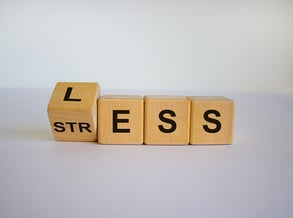Dealing with Stress
Stress manifests differently in everyone - for some it can be felt as anxiety or panic attacks, for others it's overwhelming, that urgent need to get everything done right now - this is where the love of lists is born! And then there are the lucky few who thrive on stress and work well under pressure - please teach us your ways!
Don't get me wrong, a little bit of stress can be motivation and almost "healthy' but when we're talking stress, we're talking constant or chronic stress - this is not ideal. In chronic states of stress we see a plethora of health conditions arise such as cardiovascular dysfunctions, diabetes, auto immunity, reduced immunity, anxiety and depression.

Healthy stress – is that really a thing?
It is important to understand the different between good and bad stress along with knowing what stress looks like for you and knowing your limit.
Stress is referred to as either the sympathetic or parasympathetic nervous system. The sympathetic nervous system prepares the body for a 'fight or flight' response and often rears its head during any potential danger - which is great if someone is chasing you but not so great when you are trying to close a deal or meet a deadline - hello anxiety!
Your parasympathetic nervous system works in the opposite way and is what we call 'rest and digest', ensuring your body doesn't overwork, restoring calm to the body. So neither of these systems are essentially 'bad' - they both have their time and place however when your body sits in 'fight or flight' mode for prolonged periods of time we being to see symptoms such as fatigue, brain fog, lethargy, anxiety, illness and those chronic disease states mentioned above.
Top Tips to Reduce your Stress
- Take a break
Have a kit kat… or maybe a banana – either way, get up, move around, stretch those legs out and take frequent breaks. - Exercise
Go for a walk, throw some weights around, run to the coffee shop – whatever tickles your fancy. Get up, get moving and get away from your desk. A cheeky 20- 30 minutes will do. - Breath!
Stop and take a breath relax those shoulders, unclench that jaw and take a moment. Take 5 minutes at your desk and incorporate breathing techniques. Check out our next blog on our 5 favourite breathing techniques for calming the mind. - Make a list
Gosh I love a list. I would make a list to write a list if it wasn’t insane… but seriously, planning your day or your week with a list helps reduce feelings of overwhelm. Plus there’s the added bonus of that dopamine (happy neurotransmitter) hit when you cross something off your list – who doesn’t love that feeling! - Recharge and Rejuvenate
Take a mental health day – whether you spend the day in bed watching Netflix, take a hot bath, stroll in the sunshine, treat yourself to a massage or spend the day catching up on life admin, taking down time to slow down and relax will refresh the mind and recharge the batteries. - Nourish your body
Eating well is a vital part of reducing stress. See our blog post on nourishing foods to reduce stress or book in now to talk to a nutritionist about how to reduce your stress through your diet.

